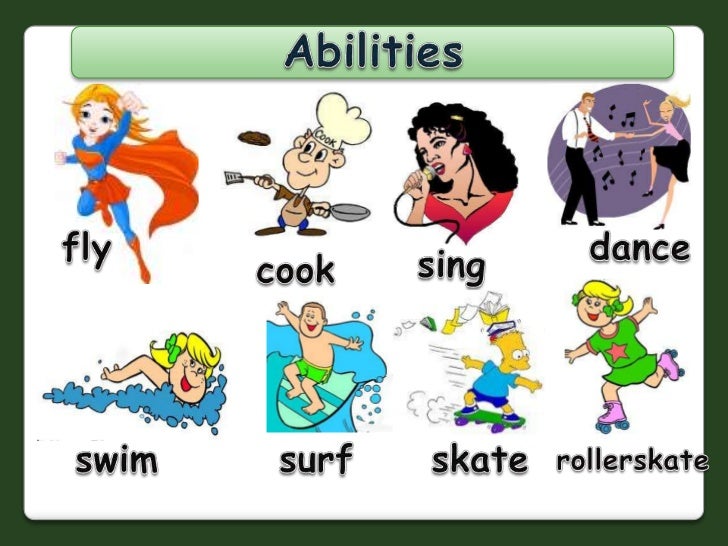- TO START

PART 1
- LOOK AT THE FOLLOWING PICTURES:


- ANSWER THE QUESTIONS: DO YOU REMEMBER THE TOPICS? WHAT DO YOU KNOW OF THEM?
- NOW, READ THE RULES LEARNED:

CAN / CAN´T

EXAMPLE:




LIKE + VERB(ING)

Use:
We can use several different words and phrases in English to talk about things we like and dislike.
1) like love enjoy
2) don’t mind
3) dislike hate can’t stand
Form:
After these words you can use a noun or a verb in the –ing form.
I like water. I like swimming.
I love sports. I love running.
We enjoy good food. We enjoy eating out.
I don’t mind housework. I don’t mind cooking.
I dislike buses. I dislike waiting.
I hate housework I hate cleaning.
Spelling rules:
Remember the spelling rules when you make the –ing form.
- If a verb ends in e, delete the e before you add –ing.
have => I love having breakfast in bed.
- If a verb ends one vowel and one consonant, double the consonant.
swim => I don’t like swimming.
Exceptions: words that end in w or y.
row => I love rowing.
sew => I don’t like rowing.
play => I like playing football.
Other exceptions:
iron => My mum hates ironing.
open => I don’t mind opening the window for you.


OBJECT PRONOUNS

An object pronoun, also called objective pronoun, functions as the object of a verb or preposition, as distinguished from a subject or subjective pronoun, which is the subject of a verb.
Examples:
- He begged her to live with him. (her is the object of the verb begged and him is the object of the preposition with)
- She told them the truth. (them is the object of the verb told)
Object pronouns are used instead of object nouns, usually because we already know what the object is.
- She's my friend. I really enjoy being with her.
- I like this film. I saw it last week.
Object Pronouns
Object pronouns in English are the following:
me, you, him, her, it, us, them

Object pronouns come after either a verb (e.g "like") or a preposition (e.g "to").
Examples:
- I like you but you don't like me.
- Do you really hate her?
- She loves sitting next to him.
- She always writes e-mails to us.
- He's talking to her about it.


POSSESSIVE PRONOUNS

We use possessive pronouns to refer to a specific person/people or thing/things (the "antecedent") belonging to a person/people (and sometimes belonging to an animal/animals or thing/things).
We use possessive pronouns depending on:
- number: singular (eg: mine) or plural (eg: ours)
- person: 1st person (eg: mine), 2nd person (eg: yours) or 3rd person (eg: his)
- gender: male (his), female (hers)
Below are the possessive pronouns, followed by some example sentences. Notice that each possessive pronoun can:
- be subject or object
- refer to a singular or plural antecedent
| number | person | gender (of "owner") | possessive pronouns |
| singular | 1st | male/female | mine |
| 2nd | male/female | yours | |
| 3rd | male | his | |
| female | hers | ||
| plural | 1st | male/female | ours |
| 2nd | male/female | yours | |
| 3rd | male/female/neuter | theirs |
- Look at these pictures. Mine is the big one. (subject = My picture)
- I like your flowers. Do you like mine? (object = my flowers)
- My flowers are dying. Yours are lovely. (subject = Your flowers)
- Your photos are good. Ours are terrible. (subject = Our photos)
- I don't like this family's garden but I like yours. (object = your garden)
- These aren't John and Mary's children. Theirs have black hair. (subject = Their children)
- John and Mary don't like your car. Do you like theirs? (object = their car)
Notice that the following (with apostrophe [']) do NOT exist: her's, your's, their's
Notice that the interrogative pronoun whose can also be a possessive pronoun (an interrogative possessive pronoun).
- Look at these examples:
- There was $100 on the table and Tara wondered whose it was.
- This car hasn't moved for two months. Whose is it?

PAST OF VERB TO BE

USE WAS/WERE TO TALK ABOUT THE PAST.
To Be - Affirmative
| Subject | To Be | Examples |
|---|---|---|
| I | was | I was tired this morning. |
| You | were | You were very good. |
| He | was | He was the best in his class. |
| She | was | She was late for work. |
| It | was | It was a sunny day. |
| We | were | We were at home. |
| You | were | You were on holiday. |
| They | were | They were happy with their test results. |
To Be - Negative Sentences
The negative of To Be can be made by adding not after the verb (was or were).
| Subject | To Be | Examples |
|---|---|---|
| I | was not | I was not tired this morning. |
| You | were not | You were not crazy. |
| He | was not | He was not married. |
| She | was not | She was not famous. |
| It | was not | It was not hot yesterday. |
| We | were not | We were not invited. |
| You | were not | You were not at the party. |
| They | were not | They were not friends. |
To Be - Negative Contractions
The can make negative contractions of the verb To Be in the Past tense by joining the verb (was or were) and n't (e.g. were not = weren't). We don't make a contraction of the subject and the verb (e.g. I was).
| I was not tired this morning. | OR | I wasn't tired this morning. |
| You were not crazy. | OR | You weren't crazy. |
| He was not married. | OR | He wasn't married. |
| She was not famous. | OR | She wasn't famous. |
| It was not hot yesterday. | OR | It wasn't hot yesterday. |
| We were not invited. | OR | We weren't invited. |
| You were not at the party. | OR | You weren't at the party. |
| They were not friends. | OR | They weren't friends. |
* Notice that we don't have contractions for To Be in Past Tense affirmative sentences.
To Be - Questions
To create questions with To Be, you put the Verb before the Subject.
| Affirmative | You | were | happy. |
|---|---|---|---|
| Subject | Verb | ||
| Question | Were | you | happy? |
| Verb | Subject | ||
| Affirmative | Question |
|---|---|
| I was late | Was I late? |
| You were sick. | Were you sick? |
| He was surprised. | Was he surprised? |
| She was from Italy. | Was she from Italy? |
| It was a big house. | Was it a big house? |
| We were ready. | Were we ready? |
| You were early. | Were you early? |
| They were busy. | Were they busy? |
To Be - Short Answers
In spoken English, we usually give short answers in response to questions.
Was he from Japan? - Yes, he was (from Japan). The last part (from Japan) is not necessary. We use shorts answers to avoid repetition, when the meaning is clear.
| Question | Short Answers** | Short Answers |
|---|---|---|
| Was I late? | Yes, you were. | No, you weren't. |
| Were you sick? | Yes, I was. | No, I wasn't. |
| Was he surprised? | Yes, he was. | No, he wasn't. |
| Was she from Italy? | Yes, she was. | No, she wasn't. |
| Was it a big house? | Yes, it was. | No, it wasn't. |
| Were we ready? | Yes, we were. | No, we weren't. |
| Were you early? | Yes, we were. | No, we weren't. |
| Were they busy? | Yes, they were. | No, they weren't. |
** With To Be, We don't use contractions in affirmative short answers.
WE ARE READY

IT'S TIME TO PRACTICES!!!!







